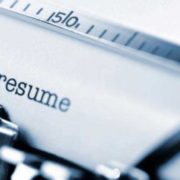Cover Letters? Yes, You Still Need One. Make It Brief and Timely!
 Cover letters? Yes, you should include one with your application. Will it get you an interview? Likely not, but by including a cover letter you demonstrate to the hiring manager you’re thorough and have solid written communication skills.
Cover letters? Yes, you should include one with your application. Will it get you an interview? Likely not, but by including a cover letter you demonstrate to the hiring manager you’re thorough and have solid written communication skills.
Frequently, cover letters are never read and won’t influence whether you get a new position. But at times, a hiring manager will read a cover letter and some consider the cover letter an essential piece of your application and interest in the company. Consequently, a simple concise cover letter will never hurt you and may help you. A compelling cover letter may help you, but it will never get you the job. If you can write a compelling cover letter because you are extremely interested in the industry or company, then do it. If you don’t know enough to be passionate about the role, then write a crisp, solid cover letter specific to the position and include: the reason you’re writing in one sentence (because of your interest in the company or you saw the position opening). Add, one recent accomplishment related to the role you’re applying for, one personal strength, and an ask, which asks for a meeting, an interview, or a conversation.
 A good cover letter should be short, related to the job, and asks for a meeting. Keep it to 250 words or less. Most employers are interested in the ‘shorter the better’ approach to cover letter writing. If that seems too brief, just remember: What you need to include in your cover letter is the job you want to fill, the reason you would be a good fit, stated simply and concisely, and an invitation for a meeting.
A good cover letter should be short, related to the job, and asks for a meeting. Keep it to 250 words or less. Most employers are interested in the ‘shorter the better’ approach to cover letter writing. If that seems too brief, just remember: What you need to include in your cover letter is the job you want to fill, the reason you would be a good fit, stated simply and concisely, and an invitation for a meeting.
With over 15 years of recruiting experience, I’ve seen cover letters go unread, but I’ve also seen instances where the hiring manager considered it a critical component to the job application, and a strong cover letter prompted them to invite the candidate to have a conversation.
When creating your cover letter there are a few fundamental rules you should follow
- Use Common Language and Speech Patterns. Be authentic and write your cover letter like you would draft an email to a business colleague.
- Show Interest. Be friendly and passionate, if it’s sincere. Don’t be overly formal because it conveys insincerity and doesn’t convey authenticity.
- Demonstrate that you understand the company.
- Don’t just restate your resume, but add something that relates to why you’re a solid fit for the role.
- Focus your letter on what you can do, not how great the company is, or why you want the job.
- Keep your letter brief, but statements should be thorough and on point. Edit your sentences to remove unnecessary verbiage.
- Highlight your personal strengths that align with the company’s culture.
- Conclude with an ‘ask’, ask for an interview, meeting or conversation to learn more and discuss your background and interest.
 A good cover letter can help you make a positive first impression quickly. It demonstrates to the prospective employer your written communication skills. Either include the cover letter with your resume when you apply or send a separate cover letter directly to the hiring manager with your resume, if you have their contact information. And, either format works, email or regular mail. Both are equally appropriate in business.
A good cover letter can help you make a positive first impression quickly. It demonstrates to the prospective employer your written communication skills. Either include the cover letter with your resume when you apply or send a separate cover letter directly to the hiring manager with your resume, if you have their contact information. And, either format works, email or regular mail. Both are equally appropriate in business.
Lastly, review your cover letter several times, and especially right before you send it. Make sure spelling is accurate and sentences strong. Nothing will kill your candidacy faster than spelling mistakes or a poorly written cover letter. And remember, most cover letters, even basic ones, can help you get to the next step, an interview.









